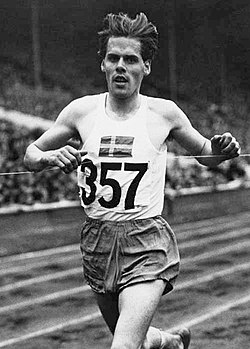Contents
| Men's 3000 metres steeplechase at the Games of the XIV Olympiad | ||||||||||
|---|---|---|---|---|---|---|---|---|---|---|
 Tore Sjöstrand | ||||||||||
| Dates | 3 August 1948 (heats) 5 August 1948 (final) | |||||||||
| Medalists | ||||||||||
| ||||||||||
| Athletics at the 1948 Summer Olympics | ||
|---|---|---|
| | ||
| Track events | ||
| 100 m | men | women |
| 200 m | men | women |
| 400 m | men | |
| 800 m | men | |
| 1500 m | men | |
| 5000 m | men | |
| 10,000 m | men | |
| 80 m hurdles | women | |
| 110 m hurdles | men | |
| 400 m hurdles | men | |
| 3000 m steeplechase | men | |
| 4 × 100 m relay | men | women |
| 4 × 400 m relay | men | |
| Road events | ||
| Marathon | men | |
| 10 km walk | men | |
| 50 km walk | men | |
| Field events | ||
| Long jump | men | women |
| Triple jump | men | |
| High jump | men | women |
| Pole vault | men | |
| Shot put | men | women |
| Discus throw | men | women |
| Javelin throw | men | women |
| Hammer throw | men | |
| Combined events | ||
| Decathlon | men | |
The men's 3000 metres steeplechase event at the 1948 Summer Olympic Games took place on 3 and 5 August. The final was won by Swede Tore Sjöstrand. Sjöstrand's compatriots, Erik Elmsäter and Göte Hagström took 2nd and 3rd place. [1]